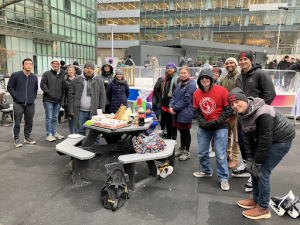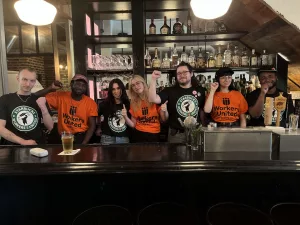In the wake of the unjust killings of unarmed Black Americans at the hands of police, from Tyre Nichols this year to George Floyd to 12-year-old Tamir Rice, Breonna Taylor, Amadou Diallo, and countless others whose stories cannot fit into one article; the lack of accountability for racialized violence and police brutality is infuriatingly clear. If you’re seeking those responsible for upholding such a vile and racist system, look no further than police unions.
Police unions engage in collective bargaining and possess the solidarity that we commonly associate with public-sector labor unions. However, the only solidarity to be found among American police unions is service to themselves — “the thin blue line.” As state employees, police unions belong in a category of their own; in fact, many labor activists would argue they don’t belong in the American labor movement at all.
Unionization and collective bargaining have completely different connotations for police unions. For starters, police unions are rarely affiliated with labor organizations such as the AFL-CIO. In some cases, police labor “associations” have both an AFL-CIO charter and an affiliation with independent groups. Police union contracts are additionally unique in that they provide officers with protections that safeguard against most disciplinary action.
While more than 80% of sworn officers are members of a police union, more than 80% of all police labor organizations are classified as independent labor groups and have little to no affiliation with the AFL-CIO. They are independent bodies with their own constitutions, structures, and strategies, which protect officers and enable them to commit acts of violence with impunity. However, before we can truly understand the role of police unions, we must analyze the origins of modern law enforcement in the United States. And for that, we must look to the antebellum South.
Slave Patrols: the Origins of American Policing
From their inception, the primary function of police, especially in Southern, slave-holding states, was to uphold white supremacist structures through oppressive violence and protect the property of the ruling class.
As early as the 1700s, groups of white volunteers were empowered by Southern states to use vigilante tactics to enforce the laws of the white aristocratic planter class. Their roles included capturing and returning escaped enslaved people, preventing slave insurrections through violence, and punishing enslaved people who violated rules on plantations.
While slave patrols operated in the plantation South, the modern police departments we know today were formed in the early 19th century in Northern cities like Boston, New York City, Albany, Chicago, and Philadelphia. In the age of industrialism and the Gilded Age, officers were likewise tasked with controlling a “dangerous underclass” made up of working-class immigrants and Black Americans.
The slave patrols were formally dissolved following the Civil War, and the all-white police departments that were formed in the aftermath of reconstruction similarly enforced restrictive Black Codes and later Jim Crow laws.
Police culture is rooted in this systemic and institutional racism, a reality the American people have been reconciling for nearly 300 years. Black Americans are still statistically more likely to be killed by police, and the role of the police in protecting the property of corporations and the billionaire class has remained the same.
In the context of the labor movement, the police have played a similarly nefarious role. The 1936 Detroit sit-down strike, the Haymarket Affair in 1886, the Battle of Blair Mountain, and Occupy Wall Street all demonstrate that police are no allies of the working class. Cops throughout history have utilized their monopoly on violence to enforce the status quo on behalf of the capitalist ruling class. In the case of Blair Mountain, around 3,000 lawmen and federal troops, in support of a coal company, killed dozens of striking miners and arrested over 900.
Qualified Immunity: a License to Kill
Across the US, police unions have used their political and collective bargaining power to further maintain the status quo and fight reforms. The so-called “Law Enforcement Bill of Rights,” a set of provisions intended to protect officers from investigation and prosecution, offers police absurd protections.
Through a series of collective bargaining agreements and civil service protections, police unions have instituted several clauses in their contracts that protect officers. For instance, “purge clauses” require police departments to remove all records of disciplinary actions against officers after periods of time typically ranging from two to five years, making it exceptionally difficult for prosecutors to gain access to records during investigations.
Officers who have been terminated due to misconduct are often rehired outside of judiciary courts and when independent review boards attempt to investigate police officers, legislative protections ensured by union contracts prevent them from doing so.
Some collective bargaining agreements determine the length of interrogations during investigations and how many interrogators are allowed in the room. In some cases, officers are allowed to review the evidence against them prior to investigations.
As of 2015, 14 states, including Minnesota, the same state where George Floyd was murdered, have codified their own variations of a Law Enforcement Officers’ Bill of Rights.
Wolves in Sheep’s Clothing
Regardless of one’s beliefs regarding how we approach the future of policing in America, whether it be defunding, major reform, or complete abolition, the truth remains that one of the biggest obstacles standing in the way of systemic change are police unions.
Police use collective bargaining to directly work against the collective interests of BIPOC communities and the working class. Their interests extend only to themselves, not the people. Meanwhile, increased union membership has effectively narrowed the racial wealth gap between Black and white workers.
As the national struggle over systemic racism and police violence worsens, it’s clear that police unions are fundamentally at odds with working-class power and incompatible with the labor movement. In 2020, the Writers Guild of America, East unanimously passed a resolution to oust the International Union of Police Associations from the AFL-CIO, and while their efforts were unsuccessful, they represent a clear step in the fight against police brutality and white supremacy.




